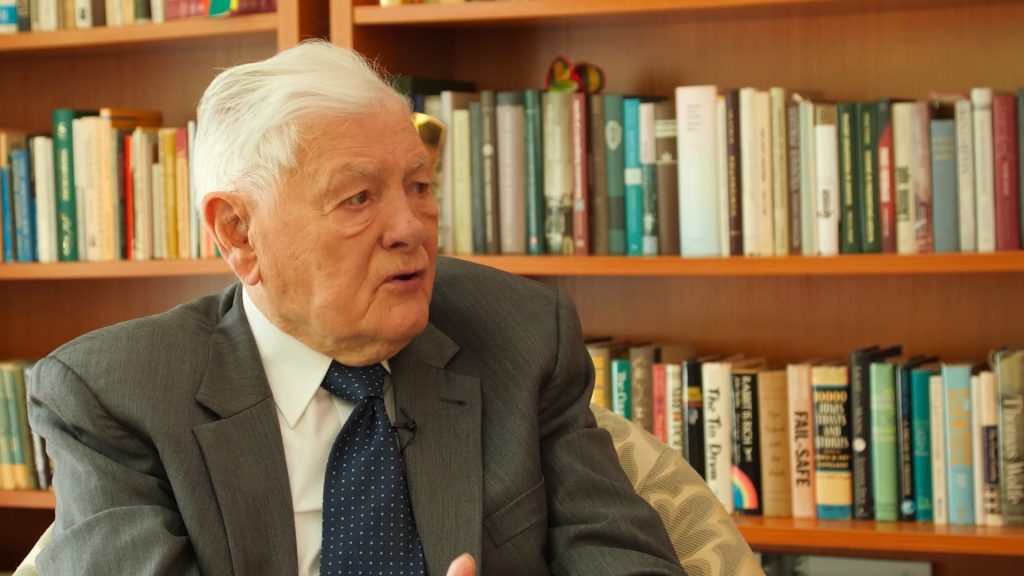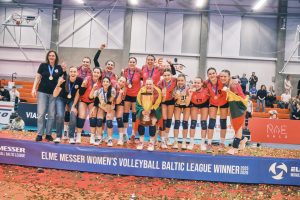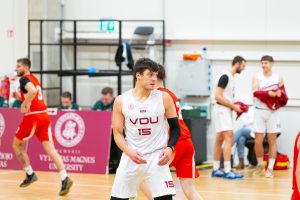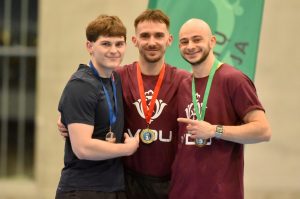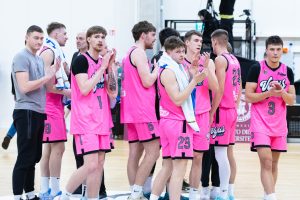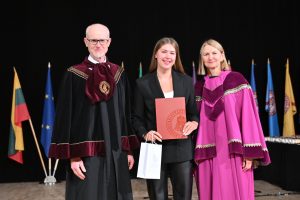Valdas Adamkus – a man whose life and bearing transcend the boundaries of political terms. He is one of the few Lithuanian leaders whose moral authority has remained unchanged even after stepping away from active politics. To understand this man’s endurance, longevity, ethical stance, and ability to unite, it is worth looking not only at his diplomatic achievements or his fight for freedom in exile.
The president begins this exclusive interview with a topic close to his heart – the stadium.
Dignified victories and defeats
For V. Adamkus, sport was never just a leisure activity. It was an environment in which his will, sense of discipline, and life philosophy were shaped.
He began playing sports at the age of twelve and eventually understood it was more than just physical activity.
“Sometimes I think that I probably spent more time at the stadium than anywhere else. There was only family, school, and the stadium – nothing else existed,” said the President.
It was there, on sports fields, that he learned team spirit, persistence, and the ability to accept victories no less gracefully than defeats.
In exile, sport became for him not only a tool of self-development but also one of the most important ways to maintain national identity.
As one of the participants of the Olympics of Captive Nations, V. Adamkus won two gold medals – a victory not only in sports, but for Lithuanian identity. He recalls:
“There we felt what it means to be Lithuanian, what it means to preserve national traditions. It was a unifying link toward the future.”
This close connection between sport and civic self-awareness followed V. Adamkus throughout his life.
Even as President, he never distanced himself from an active lifestyle – both by personal example and state-level advocacy, he promoted physical activity as an essential part of a fulfilled life.
He spoke about the role sport played in his own life in an interview with Paulius Bakanauskas, representative of the Vytautas Magnus University President Valdas Adamkus Sports Center.
The conversation took place in anticipation of the tenth edition of the sports and arts festival Adamkiada, but the content grew into a broader reflection on how sport develops a person, a university, communities, and a nation.
Values associated with the President’s name
The President’s deep connection to sport and to VMU – both personal and national – became the foundation for naming the Vytautas Magnus University Sports Center after him.
It is not just a sign of respect but a responsibility for the center’s community.
It is important to note that in 1989, Valdas Adamkus participated in the re-establishment of VMU and is an honorary member of the VMU Restoration Council.
On December 18, 2001, he was awarded the title of Honorary Doctor of Vytautas Magnus University.
From 2010 to 2020, he served as Chairman of the University Council.
According to V. Adamkus, the sports center bearing his name must carry the values associated with it: equal attention to both professional and amateur sports, as both foster growth and national unity.
“I think it’s important to encourage not only professional sports but also the amateur interest, which often expresses itself more strongly than professionalism.
I agree that professionalism in all areas of life has value – and it will remain important in the future.
But at the same time, we must support the ideological foundation of amateur sport, which, I would say, is one of the forms of education and even preservation of national identity,” – said V. Adamkus.
Today, this sports center is one of the most modern in Lithuania, and the most advanced in the Baltic region in terms of serving student sports.
It is used by VMU students and elite-level athletes. In 2024, three of the eight teams participating in the Paris Olympic Games in 3×3 basketball trained here: Lithuania, Latvia, and Poland.
In addition to training across multiple sports, this venue hosts football, basketball, volleyball, and even baseball matches.
Maintaining its attention to amateur sports, the center also organized a dodgeball tournament for school students, in which well-known VMU students competed alongside pupils.
As a result of the center’s environment and resources, VMU ranked among the top five universities in Europe for sports awards last year.
Regionally, they are unmatched – in the SELL Games, which unite universities from Finland, Estonia, Latvia, and Lithuania, VMU came first in medal count both this and last year.
“The opening of this center enables development, unity, and preservation of traditions.
I believe it is one of the strongest combinations of personality, nationality, and community,” – said V. Adamkus.
University sport – a space for personal development
When asked about university sport in the U.S. and Lithuania, the President emphasized that nowadays, there is growing focus on results – something that changes the very essence of sport.
“Sport, whether in universities or outside them, from my perspective, is now purely professional.
That amateur spirit, which existed during my upbringing, is almost gone,” said V. Adamkus.
According to the President, such professionalism is necessary, but shouldn’t be the only path.
Sport must also remain a daily tool for human growth – without pressure, without commercialism, but with clear inner value.
“If you’re talented – go make money. That doesn’t quite sit well with me, because I grew up in a completely different sporting spirit,” – he explained.
He believes that universities not only have the opportunity, but the responsibility to provide space for amateur sport – as an accessible, inclusive activity that fosters community, builds character, and helps students find balance between mind, body, and values.
Asked if universities should actively promote amateur sport, the President replied shortly but firmly:
“Yes, without a doubt.”
More than a celebration – the continuation of tradition
This year, on June 7, the VMU President Valdas Adamkus Sports Center will again host the annual sports and arts festival Adamkiada.
Now celebrating its 10th edition, the event gathers students from schools supported by the Alma Adamkienė Charity and Support Fund across Lithuania.
This is a unique platform where young talents can express themselves not only in sports competitions, but also in creative and artistic performances.
To the President, this festival is more than an event. It is a way to continue the ideals he believes in when speaking about sport: education, national consciousness, and guiding youth toward meaningful activities.
“It’s the foundation of those ideas we discussed. I believe these Olympics will continue to attract young people – to connect, improve, and preserve the Lithuanian spirit,” – he said.
Asked about Adamkiada’s significance for children in rural regions, the President expressed joy that it has become a unifying event capable of bringing together different social layers into shared activity.
“It’s a kind of merging of different social strata. Whether it’s a village, town, or city – the main goal remains the same: to grow and preserve community,” – he noted.
A message to the entire sports community
Throughout the conversation, President Adamkus repeatedly emphasized the importance of amateur sport – not just as physical exercise, but as a way to develop a person, as a citizen, and as a member of a community.
In his view, it is amateur sport – rooted in togetherness and voluntary participation – that has the power to form character, strengthen national awareness, and cultivate a sense of responsibility.
This belief is best illustrated by his message to the community of the VMU President Valdas Adamkus Sports Center – to the people for whom this space has become an inseparable part of life:
“I wish for there to be sport – amateur sport. That it would shape personalities, gather youth, and continue serving the path of growth.”
This is not just a wish. It is a direction the President sees as the mission of sport in Lithuania.
Sport must be accessible, alive, growing with the person – not just as a workout, but as a daily form in which willpower, respect, endurance, and awareness are cultivated.
The kind of sport that helped shape the President himself.
And the kind of sport he now wishes for the entire sports community and future generations.

